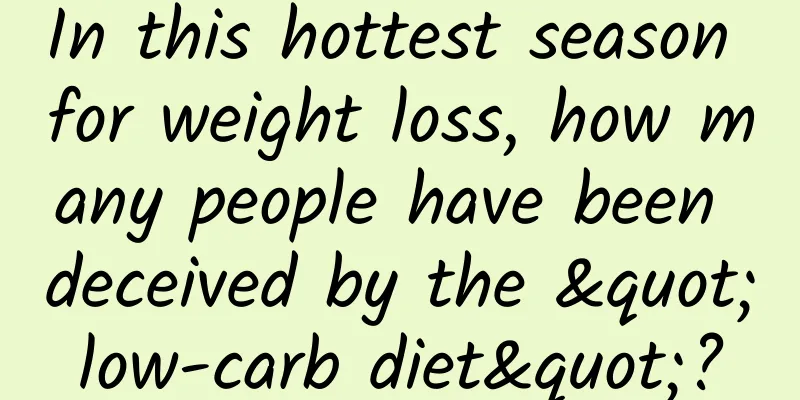In this hottest season for weight loss, how many people have been deceived by the "low-carb diet"?

|
Audit expert: Wang Guoyi Postdoctoral fellow in Nutrition and Food Safety, China Agricultural University As the saying goes, "If you don't lose weight in April, you'll regret it in May." As the weather gets hotter, many of my friends have started their weight loss plans. Source: Internet Some time ago, the topic of "Don't eat only boiled vegetables to lose weight" became a hot search. A blogger insisted on not eating carbohydrates and only eating boiled vegetables for a period of time. In the end, he did not lose weight, but became dazed and weak. Carbohydrates have always been regarded as the culprit of weight gain. With the increasing demand for weight loss among modern people, low-carb diet has become a new trend. However, is it really effective to eat almost no carbohydrates in order to lose weight? Source: pixabay Today, I will give you a detailed introduction to the secrets behind the "low-carb diet"~ First of all, we need to know what a "low-carb diet" is. The so-called low-carb diet means reducing the carbohydrate content in the diet. Carbohydrates are organic compounds composed of three elements: C/H/O, with the ratio of H to O being 2:1 (the same ratio as the elements that make up water). They are mainly divided into monosaccharides, oligosaccharides, and polysaccharides. In our daily lives, foods containing carbohydrates can be found everywhere, such as white sugar, rice, pasta, potatoes, sweet potatoes, juice, milk, nuts, etc. Source: Low Carb Diet Intelligence Bureau Carbohydrates are the main energy source for living organisms. After being absorbed and broken down by the human body, they form glucose, which can participate in regulating cell activities, provide energy for the human body, regulate human metabolism, and participate in various important physiological activities of the body such as cell composition (such as red blood cell surface antigens). Carbohydrates play a vital role in the human body's metabolism. If insufficient carbon absorption occurs, many negative effects will occur, like the blogger in the hot search above. Source: Baidu Pictures The BBC once published an article: A low-carb diet increases the risk of death and shortens life expectancy. Specifically, the hazards of a low-carb diet are as follows: Hazard 1: Insulin “failure” As we all know, the pancreas in the human body secretes insulin to regulate blood sugar. If you eat a low-carb or even a no-carb diet for a long time, it will inhibit the secretion of insulin, which will lead to a decrease in the sensitivity of the body's cells to insulin. Over time, this will be detrimental to blood sugar control. Hazard 2: Hypoglycemia and increased metabolic risk If a low-carb diet is adopted for a long time, the human body cannot obtain the required sugar from carbohydrates, which can easily lead to hypoglycemia, especially after strenuous exercise, which can easily cause fainting due to hypoglycemia. Secondly, since the source of sugar is blocked, the body will obtain sugar by breaking down fat in order to meet energy needs, but a large number of ketone bodies will also be produced in the process. Source: Zhongkang Physical Examination Network Under normal circumstances, the human body mainly takes in carbohydrates from the outside world for body functions, and the ketone bodies produced are not much and will be metabolized quickly. However, when the body's energy mainly comes from fat metabolism, the ketone body level in the blood will increase significantly, which will bring a burden to the body's metabolism and easily cause metabolic ketosis. Hazard 3: The human body becomes weaker If a low-carb diet is adopted for a long time, the body will not get enough energy, which can easily lead to insufficient energy for brain cells and tissues and functional decline. The direct manifestations are slow reaction, fatigue, and weakness in the limbs. If this continues for a long time, people will become weaker and weaker. Since a low-carb diet is so harmful to the human body and a high-carb diet is prone to obesity, how should we combine them? The answer is "scientific intake + high-quality carbohydrates". Source: pixabay According to the average carbohydrate requirement (EAR) recommended by Chinese residents, adults need to consume 120-130g of carbohydrates per day to meet the body's daily blood sugar needs. Generally speaking, a bowl of 200g cooked rice contains 52g of carbohydrates, and 300g of potatoes (about 2 potatoes) contain 54g of carbohydrates. Eating two bowls of rice and two potatoes a day is enough to meet the carbohydrate requirement. Therefore, in order to consume more and healthier foods, we can choose high-quality carbohydrates to consume. What are high-quality carbohydrates? High-quality carbohydrates are also called slow carbohydrates, which generally refer to intact carbohydrates that have not been deeply processed. They remain in the human body for a long time and are digested slowly. They can prolong the feeling of fullness while satisfying the basic blood sugar level, and will not cause blood sugar to soar. Common high-quality carbohydrates include cereals, whole grains, beans, potatoes, etc. Here, let’s introduce low-quality carbohydrates. Low-quality carbohydrates generally refer to processed carbohydrates with high sugar content. They are easily absorbed by the human body and can easily cause a spike in blood sugar after a meal. Common low-quality carbohydrates include refined rice and noodles, beverages, desserts, candies, etc. Source: pixabay Some friends may ask, some fruits have high sugar content, can they be eaten? Different fruits have different sugar contents. Eating a proper amount of fruits every day can supplement dietary fiber without consuming too much sugar. But it is important to note that you must not blend the fruits into juice. When the fruits are ground into juice, the dietary fiber is destroyed and the nutritional loss is serious, which is not worth the gain. Source: pixabay In short, carbohydrates are not our "enemy". Only by eating scientifically and consuming an appropriate amount of high-quality carbohydrates can we have a healthy body. In addition, regarding weight loss, the editor believes that this is by no means something that can be achieved overnight. Whether you are still losing weight or have failed after many attempts, as long as we work hard, eat scientifically + exercise moderately, and persist step by step, we will definitely see results! The most important thing is, whether you lose weight or not, recognize and accept yourself. Body anxiety is not desirable. Confidence is always the most beautiful. |
Recommend
Japan builds world's largest artificial solar power island
Japan is about 146,000 square miles (378,000 squa...
The new media red ocean is approaching. How can corporate new media make a second breakthrough in 2017?
It is standard for companies to have new media ac...
20 trends and heartfelt suggestions for brands in 2022
I have compiled 20 brand trends and suggestions f...
Is it true that we cannot use air conditioning all the time in summer?
This year has entered the dog days The dog days w...
Apple's reduction in supply of high-end models means an opportunity for domestic brands to enter the high-end market?
Due to the global supply crisis of semiconductors...
There is a secret hidden in this position on the RMB, remember to touch it when putting the red envelope in!
Today is Chinese New Year's Eve. Are you read...
How to build a user points system?
Points is a magical word and the boss is always t...
The most comprehensive Zhihu operation and promotion skills!
There is strength in numbers, and more firewood m...
What are we talking about when we talk about urban biodiversity?
According to legend, a large company interviewed ...
Don’t Make These Mistakes in Mobile Menu Design
[[132830]] When we want to make user navigation o...
Advanced on-demand marketing techniques for video platforms!
Recently, the advanced on-demand broadcast of &qu...
When writing copy, write something funny
The essence of copywriting is to achieve the desi...
A thoughtful iOS development specification
Preface Although it is called a preface, it is ac...
How amazing is 5G folding screen technology? One picture explains the black technology behind it
[[258342]] 5G technology, folding screen, and hig...









